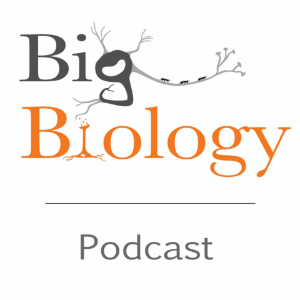
Big Biology
Science Podcasts
The biggest biology podcast for the biggest science and biology fans. Featuring in-depth discussions with scientists tackling the biggest questions in evolution, genetics, ecology, climate, neuroscience, diseases, the origins of life, psychology and more. If it's biological, groundbreaking, philosophical or mysterious you'll find it
bigbiology.substack.com
Location:
United States
Genres:
Science Podcasts
Description:
The biggest biology podcast for the biggest science and biology fans. Featuring in-depth discussions with scientists tackling the biggest questions in evolution, genetics, ecology, climate, neuroscience, diseases, the origins of life, psychology and more. If it's biological, groundbreaking, philosophical or mysterious you'll find it bigbiology.substack.com
Language:
English
Website:
https://www.bigbiology.org/
The Origin of Us: Human Evolution
Duration:01:00:38
Covid Conversations (Ep 138)
Duration:00:46:26
Student Spotlight: Finding passion in science communication and advocacy (Ep 137)
Duration:00:35:49
The call of the wild (Ep 136)
Duration:00:32:47
Not all heroes have spines (Ep 135)
Duration:00:32:02
#SaveNSF (Episode 134)
Duration:00:53:49
Cover art behind the scenes: Feel the heat
Duration:00:01:57
Feel the heat (Ep 132)
Duration:01:16:03
Secrets in the structure (Ep 131)
Duration:00:24:32
Post-match chat: A direct hit
Duration:00:06:24
A Direct Hit (Ep 130)
Duration:00:59:26
Behind the scenes audio
Duration:00:01:55
Beaks on (fitness) peaks (Ep 129)
Duration:00:29:12
Homo pathogenesis (Ep 128)
Duration:00:22:35
Devo-lutionary theory (Ep 127)
Duration:00:31:03
What does it take to change the world? (Ep 126)
Duration:00:39:47
A quiet place (Ep 125)
Duration:01:26:40
Spiny, but social (Ep 124)
Duration:00:34:28
The long and winding road (Ep 123)
Duration:00:30:06
Ahead of the (thermal) curve (Ep 122)
Duration:00:32:28